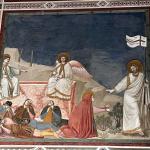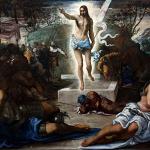In his fascinating book, Divine Symmetries , Victor Wilson points to a series of parallels between Ishmael’s banishment from Abraham’s camp (Gen 21) and the sacrifice of Isaac (Gen 22):
1. Yahweh’s command, 21:10; 22:2: “cast out this . . . son”; “take your son”
2. Early rising, 21:14; 22:3: “Abraham rose early”
3. Journey, 21:14; 22:3-4
4. Burden, 21:14; 22:6: “Abraham took bread and a skin of water . . . putting it on her shoulder”; “Abraham took the wood . . . and laid it on his son Issac”
5. Distress and near-death of son, 21:16-17; 22:7
6. Angel intervenes, 21:17; 22:11
7. Protection of son, 21:18; 22:12: “lift up the boy”; “do not lay your hand on the boy”
8. Eyes opened, 21:19; 22:12: “God opened his eyes”; “Abraham looked up and saw”
9. Means of salvation, 21:19; 22:13: “well of water”; “ram, caught in a thicket”
10. Departure to home, 21:21; 22:19: “lived in . . . Paran”; “lived in Beersheba”
Wilson doesn’t do much this these parallels, but several (sketchy) conclusions suggest themselves. First, these parallels help to support Paul’s allegorization of the Ishmael-Isaac story in Gal 4. There, Ishmael as the first son corresponds to the children of flesh and the present Jerusalem, ie, Judaism, while Isaac is the child of promise/spirit who corresponds with the Jerusalem above. With these parallels in mind, we can deepen our grasp of Paul’s allegory: Isaac goes through the same history as Ishmael, but with different results. Isaac is the type of Christ (Heb 11), and so the parallels also fit with the notion that Jesus recapitulates the history of Israel (which is the history of Ishmael, according to Paul).
Second, the parallels brings out the connection of exile and sacrifice. Ishmael is banished to a new home, and Isaac, in a parallel action, goes through a death and resurrection experience.
Third, this is further evidence that the life of Abraham is a preview of the history of Israel. Gen 20 gives us an exile and return, a second exodus (cf. ch 12), corresponding the exodus to and return from Babylon. Then comes Ishmael’s permanent exile, corresponding in some way specifically to the intertestamental, postexilic history of Israel. Then the crucifixion in ch 22.
Surely there’s more to say, and better ways to say it.















